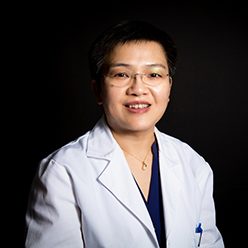Research Interests
Dr. Zhu's principal research interests encompass emmetropization, visual development and myopia. Specifically, she has been studying the signaling molecules regulating emmetropization and temporal integration of defocus, in search of potential methods for preventing and/or treating myopia in school-aged children, because myopia is a major public health concern and is speculated to affect half of the population by 2050. It is important to understand the molecular pathways involved in eye growth modulation and myopia development, and her research has shown that glucagon and insulin are potential signaling molecules that act to reduce and enhance myopia development, respectively. In addition, Dr. Zhu also discovered that the retina does not integrate defocus in a linear fashion. In fact, the signals regulating eye growth rise quickly and become saturated during the exposure, and decay slowly between exposure. Also, the signals regulating hyperopic development are very long lasting, which may explains why myopic defocus can be used to reduce myopia progression, Dr. Zhu is currently collaborating with Drs. Regan Ashby and Pauline Kang in Australia to further investigate the retina’s response to defocus.
Dr. Zhu is also conducting multiple clinical trials to study the effect of accommodation on the effect of multifocal contact lenses for myopia control. Preliminary results that reduced accommodation during contact lens wear is associated with axial elongation.
Clinical Interests
Myopia control in school-aged children and adults with progressive myopia, using Orthokeratology, multifocal soft contact lenses, low dose atropine, and bifocals/PALs.
Publications
- Temporal properties of positive and negative defocus on emmetropization, Nature Scientific Reports 12 3582 3582, 2022
- Chick Eyes Can Recover from Lens Compensation without Visual Cues, Optom Vis Sci 97 (8): 606–615 606–615, 2020
- In vitro effects of insulin and RPE on choroidal and scleral components of eye growth in chicks., Experimental eye research 116 439-48 439-48, 2013
- Temporal integration of visual signals in lens compensation (a review). , Exp Eye Res 114 (Sep): 69-76 69-76, 2013
- Effects of muscarinic agents on chick choroids in intact eyes and eyecups: evidence for a muscarinic mechanism in choroidal thinning., Ophthalmic & physiological optics : the journal of the British College of Ophthalmic Opticians (Optometrists) 33 (3): 245-56 245-56, 2013
- Eyes in various species can shorten to compensate for myopic defocus., Investigative ophthalmology & visual science 54 (4): 2634-44 2634-44, 2013
- Temporal properties of compensation for positive and negative spectacle lenses in chicks, IOVS 50 (1): 37-46 37-46, 2009
- Opposite effects of glucagon and insulin on compensation for spectacle lenses in chicks., Investigative ophthalmology & visual science 50 (1): 24-36 24-36, 2009
- In a matter of minutes, the eye can know which way to grow., Investigative ophthalmology & visual science 46 (7): 2238-41 2238-41, 2005
- Ocular compensation for alternating myopic and hyperopic defocus., Vision research 45 (13): 1667-77 1667-77, 2005
- Potency of myopic defocus in spectacle lens compensation., Investigative ophthalmology & visual science 44 (7): 2818-27 2818-27, 2003
Presentations
- Uncorrected Visual Acuity Showed More OFF-Pathway Deficit in Myopic Children, 2023
Poster
